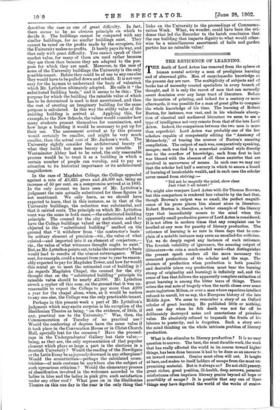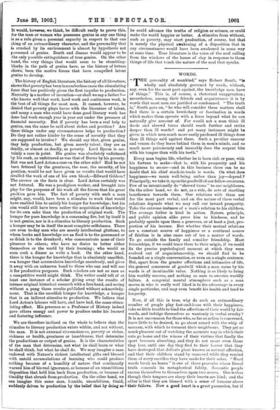THE RETICENCE OF LEARNING.
THE death of Lord Acton has removed from the sphere of human mental activity a man of prodigious learning and of abnormal gifts. Men of encyclopaedic knowledge at the present day are rare. The multiplicity of subjects and of books has of necessity created specialists in every branch of thought, and it is only the rarest of men that can earnestly assert dominion over any large tract of literature. Below the invention of printing, and indeed for a century or more afterwards, it was possible for a man of great gifts to compass the whole knowledge of his time. The learning of Robert Burton, for instance, was vast, and in his wholesale absorp- tion of classical and mediaeval literature we seem to see a type of intelligence not very remote from that of the late Lord Acton. Indeed, the comparison between the two men is more' than superficial. Lord Acton was probably one of the few scholars capable of competently editing the " Anatomy of Melancholy," of tracing the sources of Burton's amazing compilation. The output of each was, comparatively speaking, meagre; each was tied by a somewhat crabbed style directly due- to the overflow of knowledge; each from first to last was blessed with the absence of all those anxieties that are involved in narrowness of means. In each case we may say that the scholar bad half a century in which to amass a hoard of learning of incalculable wealth, and in each case the scholar never ceased from striving Did not he magnify the mind, show clear Just what it all meant ?"
We might also compare Lord Acton with Sir Thomas Browne, but this comparison is rendered less valuable by the fact that, though Browne's output was so small, the perfect magnifi- cence of his prose places him almost alone in literature. Robert Burton is, therefore, a better example of the literary type that immediately occurs to the mind when the apparently small productive power of Lord Acton is considered. It is not often in modern times that any complaint can 'be levelled at any man for paucity of literary production. The reticence of learning is so rare in these days that to com- plain of a notable instance may seem an uncalled-for criticism. Yet we do deeply regret any instance of such reticence. The feverish volubility of ignorance, the amazing output of illiterature—to coin a much-needed word—that distinguishes the present epoch renders all the more necessary the measured productions of the scholar and the sage. The absence of production when production is both possible and desirable (since any production must bear the burning stamp of originality and learning) is infinitely sad, and the sense of loss that follows the apparently complete extinction of great learning is among the bitter tears of things. There arises the real note of tragedy when the earth closes over some mute inglorious Milton, or over a man whose capacious intellect refused to unroll, let us say, the European history of the late Middle Ages. We seem to remember a story of an Orford scholar of great learning. He published little or nothing, and one day when he felt death was not far off he deliberately destroyed notes and annotations of priceless value. He absolutely refused to bequeath the fruits of his labours to posterity, and is forgotten. Such a story sets the mind thinking on the whole intricate problem of literary production.
What is the stimulus to literary production P It is no easy question to answer. The best, the most durable work, the work that has really affected the world in its course toward higher things, has been done because it had to be done as an answer to an inward command. Genius most often will out It laughs at bars, and makes to itself ladders of escape from the most un- promising material. But is it always so P Do not chill penury, great riches, great position, ill-health, deep sorrows, personal misfortunes often imprison literary genius beyond all hope or possibility of escape P It is possible that any one of these things may have deprived the world of the works of zenius.
It would, however, we think, be difficult really to prove this, for the man or woman who possesses genius in any one thing is as a rule given a personal capacity in respect to that one thing of an extraordinary character, and the personality that is crushed by its environment is almost by hypothesis not possessed of genius. Death and disease would appear to be the only possible extinguishers of true genius. On the other hand, the very things that would seem to be stumbling- blocks in the path of genius have, as the history of letters slicets," been the motive forces that have compelled latent genius to develop.
The history of English literature, the history of all literature, shows that poverty has been innumberless cases the stimulating force that has positively given the first impulse to production.
Necessity ie a mother of invention—or shall we say a father ?— who knows_ well that work, hard work and continuous work, is the best of all things for most men. It cannot, however, be denied that poverty plays havoc with the literature of talent, and many a man who could have done good literary work has
done bad work enough year in year out under the pressure of financial necessity. But if poverty has been a real help to genius, can the same be said about riches and position? Are these things under any circumstances helps to production? Do they not rather binder by the sense of security that they are supposed to involve ? We should say that, given genius, they help production, but given merely talent, they are as deadly, or almost as deadly, as poverty. Lord Byron is cer- tainly a case in point. His genius was absolutely unfettered by his rank, as unfettered as was that of Burns by his poverty. But was not Lord Acton a case on the other side? Had he not been fettered by the greatness, the ease, the security, of his position, would be not have given us results that would have rivalled the work of one of his own blood,—Edward Gibbon ? The answer on the facts is clear. Lord Acton certainly was not fettered. He was a prodigious worker, and brought into play for the purposes of his work all the forces that his great position gave him. The fact of poverty with such a man might, nay, would, have been a stimulus to work that would have enabled him to satisfy his hunger for knowledge; but his aim would still have been rather the acquisition of knowledge for its own sake than the production of original work. The hunger for pure knowledge is a consuming fire, but by itself it is not genius, nor is it a stimulus to literary production. Such a hunger may be in itself the most complete selfishness. There are even to-day men who are merely intellectual gluttons, to whom books and knowledge are as food is to the gourmand or as -drink is to the drunkard ; who communicate none of their pleasure to others; who have no desire to better either themselves or the world by their learning ; who would as soon cook a dinner as write a book. On the other hand, thOre is the hunger for knowledge that is absolutely unselfish, —a hunger that accumulates knowledge ceaselessly, and gives it away with an unknown hand to those who can and will use it for productive purposes. Such scholars are not so rare as a competitive world might think. The writer could tell of at least one instance of a scholar giving away the results of intense original historical research with a free hand, and seeing without a pang those results published without acknowledg- ment. That is the unselfish hunger for knowledge, a hunger that is an indirect stimulus to production. We believe that Lord Acton's labours will have, and have had, the same stimu- lating effect. His presence as a Professor of History indeed gave others energy and power to produce under his learned and fostering influence.
We are therefore inclined on the whole to believe that the stimulus to literary production exists within, and not without, the man. It is not external circumstances, poverty or riches, sickness or health, greatness or humbleness, that determine the productions or output of genius. It is the characteristics of the man that determine, not what he shall learn or what he shall think, but what he shall do. We may imagine a man endowed with Nature's richest intellectual gifts and blessed with untold accumulations of learning who could produce nothing because of a humility of nature that continually warned him of his real ignorance, or because of an unambitious disposition that held him back from production, or because of timidity that shrank from production. On the other hand, we can imagine this same man, humble, unambitious, timid, suddenly driven to production by the belief that by doing so
he could advance the truths of religion or science, or could make the world happier or better. A stimulus from without, such as poverty, may start production, of course, but that is merely the physical awakening of a disposition that in any circumstances would have been awakened in some way at some time. True literature is the voice of the soul calling from the windows of the house of clay in response to those things of life that touch the nature of the soul that speaks.



















































 Previous page
Previous page